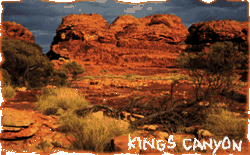
| I head on, out to the edge of the world, then swing south to
Gosse Bluff National Park, before cutting back east to Hermannsburg -
population 420 - the most important Aboriginal community for many a
sandy mile. I love the name. You expect castles and sauerkraut, but
all you get in "the Rome of Central Australia" is dreams and dust.
German Lutheran pastors established Hermansburg in 1876. Albert
Namatjira, the most famous Aboriginal artist, was born here, as was
Ted Strehlow, who grew up with the local Aranda people and became
their first deserving linguist and anthropologist. They gave him vast
numbers of sacred objects, which are now locked in a vault in Alice
Springs. Who should have them is hotly disputed; it is forbidden for
the uninitiated to see them.
 An hour's rough ride south is Palm Valley, an oasis of water and
unique palm trees on the Finke River, the oldest active watercourse on
earth, at 150 million years. From here, I backtrack to hit the new,
unpaved Mereenie Loop Road forging its way out to rugged Watarrka
National Park and King's Canyon.
An hour's rough ride south is Palm Valley, an oasis of water and
unique palm trees on the Finke River, the oldest active watercourse on
earth, at 150 million years. From here, I backtrack to hit the new,
unpaved Mereenie Loop Road forging its way out to rugged Watarrka
National Park and King's Canyon.
A three-hour canyon rim walk - wild, free, and mindblowing -
reveals the Lost City, a maze of weathered sandstone domes, and the
Garden of Eden, a palm-rimmed waterhole tucked secretly away in the
heart of the canyon. It's remote, but the tour buses have found it:
the multi award-winning Aboriginal-owned resort of King's Canyon, from
where tourists take Aboriginal-run tours of local rock art sites. It's
the sort of place that haunts your dreams.
Southwards, it's 200-plus kilometers (130 miles) to the next
surface water, at Curtin Springs cattle station. Nearby Mount Conner,
a massive and sacred 700 million-year-old mesa just four meters lower
than Uluru, is accessible only by tour from Yulara, Uluru's adjacent
resort.
|
